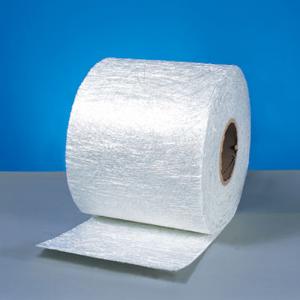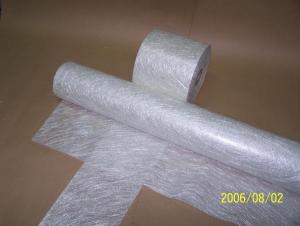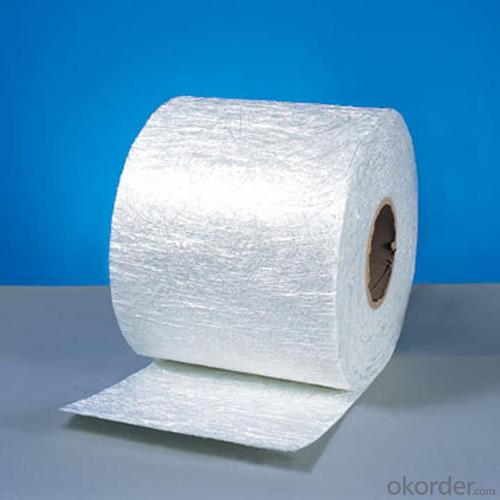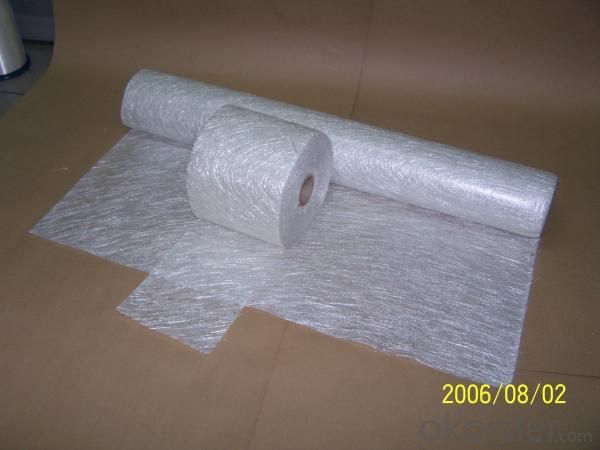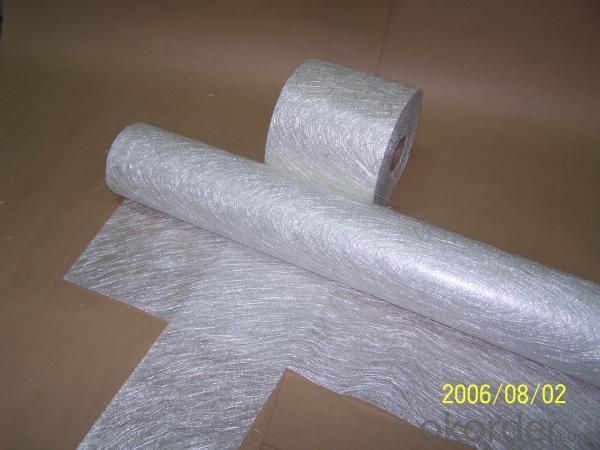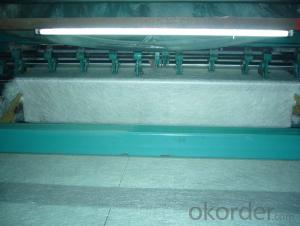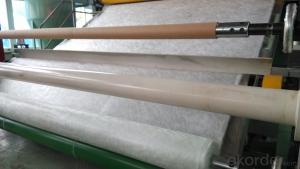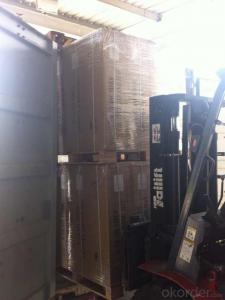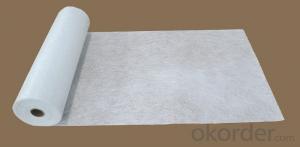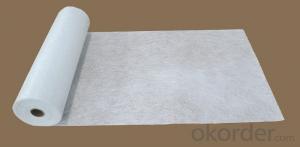Fiberglass Mat Tissue E-Glass Chopped Strand Mat
- Loading Port:
- China Main Port
- Payment Terms:
- TT or LC
- Min Order Qty:
- 100000 kg
- Supply Capability:
- 6000000 kg/month
OKorder Service Pledge
OKorder Financial Service
You Might Also Like
Specifications of E-glass Chopped Strand Mat
1.the composit products have high dry and wet tensile strenth and good transparency.
2.Low fuzz ,dirt ,impurity and other stain
Introduction of E-glass Chopped Strand Mat
Chopped strand mat is made from fiberglass chopped strands boned with powder binder or emulsion binder.
E glass chopped strand mat is made from fiberglass strands chopped to length and bonded together
with powder binder. Chopped strand mat is used primarily for hand lay-up processes, filament winding and press molding of FRP products. Typical products include bathroom
accessories, pipe, building materials, automobiles, furniture and other FRP products.
This products ischaracterized bg good combination of resin,easg operation ,good wet strengthretention,good laminate transparency
E glass chopped strand mat is made from fiberglass strands chopped to length and bonded together
with powder binder. Chopped strand mat is used primarily for hand lay-up processes, filament winding and press molding of FRP products. Typical products include bathroom
accessories, pipe, building materials, automobiles, furniture and other FRP products.
This products ischaracterized bg good combination of resin,easg operation ,good wet strengthretention,good laminate transparency
glassfiber chopped strand mat is a non woven E glassfiber mat product manufactured by spreading continuos filament rovings of 50mm in length randomly and uniformly in combination with polyester binder in power form( or other binder in emulsion form)
This product is characterized by good combination fo resin,easy operation, good wet strength retention,good laminate transparency and low cost, it is suitable for the applicationn by hand lay-up FRP mounding,such as: various sheet and panels, boat hulls,bath tubs,cooling towers, corrosion resistant,vehicles etc.
made from fiberglass chopped strands bonded with powder binder,easy operation, good wet strength retention
Features of E-glass Chopped Strand Mat
1.Warp and weft rovings aligned in a parallel,flat manner and uniform tension .
2.Densely alighed fibers,providing high dimensional stability ans easy handing .
3.Good moldability,fast and complete resin wet-out ,enabling high productively .
4.Good transporsision and hign strength of the composite products.
5.Even thickness ,no fuzz ,no stain.
6.Fast wet-out ,products with high strength ,little loss for strength in damp situation.
7.fiberglass woven roving has the features of : high tensile strength, corrosion resistance, flame retardance,insulativity.main function
8.applied to hand lay-up process
9.to reinforce UP resin
10.even thickness and flawless
11.good performance of processability in moulded parts
12.properties guaranteed under moisture condition
13.excellent mechanical strength during production of finished products
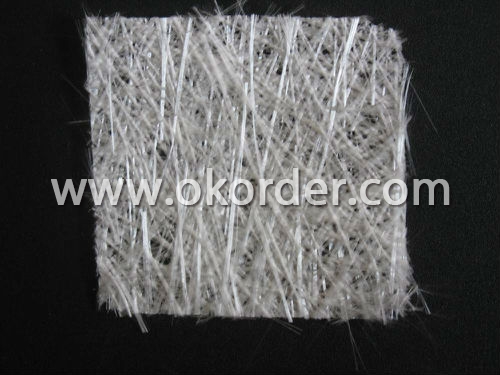
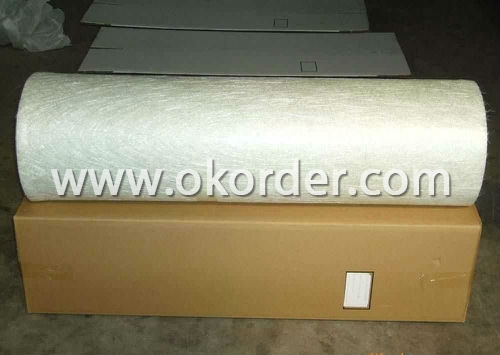
- Q: How does the weight of fiberglass mat tissue affect its performance?
- The weight of fiberglass mat tissue significantly affects its performance. The weight of the tissue refers to the amount of glass fibers per unit area. Generally, a higher weight indicates a higher concentration of fibers, which leads to improved strength and durability. Firstly, a heavier fiberglass mat tissue provides better tensile strength. The increased number of fibers in the tissue allows it to withstand higher levels of stress and strain without breaking or tearing. This makes it ideal for applications that require high load-bearing capacity, such as structural components in construction or automotive industries. Moreover, the weight of the tissue also influences its stiffness and rigidity. A heavier mat tissue offers better dimensional stability, meaning it will retain its shape and form even when subjected to external forces. This is crucial in applications where the material needs to maintain its structural integrity, such as in boat hulls or wind turbine blades. Furthermore, the weight of the fiberglass mat tissue affects its thermal and acoustic insulation properties. A higher weight typically correlates with better insulation capabilities, as the increased fiber density enhances the material's ability to trap air and reduce heat transfer or sound transmission. This makes it suitable for applications that require effective insulation, such as in buildings or industrial equipment. Lastly, the weight of the fiberglass mat tissue can impact its ease of handling and installation. A lighter tissue may be more flexible and easier to manipulate, making it simpler to fit into complex shapes or tight spaces. On the other hand, a heavier tissue might require additional support or equipment during installation. In conclusion, the weight of fiberglass mat tissue directly influences its performance characteristics, including tensile strength, rigidity, insulation properties, and ease of handling. Therefore, it is essential to consider the intended application and the desired performance requirements when selecting the appropriate weight of fiberglass mat tissue.
- Q: Is fiberglass mat tissue resistant to moisture?
- Yes, fiberglass mat tissue is resistant to moisture. Fiberglass mat tissue is made from tightly woven strands of glass fibers, which are then bonded together with a resin. This resin creates a barrier that prevents moisture from penetrating the tissue. As a result, fiberglass mat tissue is highly resistant to moisture and can be used in applications where exposure to water or high humidity is expected. Additionally, the moisture resistance of fiberglass mat tissue helps prevent the growth of mold or mildew, making it a suitable choice for damp environments.
- Q: Can fiberglass mat tissue be used for boat building?
- Certainly, fiberglass mat tissue is a viable option for boat construction. It is a versatile and lightweight material that is frequently utilized in the building of boats. Its composition consists of thin fiberglass strands woven together to form a mat-like structure. This material is renowned for its exceptional strength-to-weight ratio, making it an optimal selection for boat builders. The utilization of fiberglass mat tissue in boat construction primarily serves to fortify the structure and provide added durability. It can be applied to various parts of the boat, including the hull and deck, to enhance its resilience and safeguard it against impacts. Moreover, it can be employed to create a smooth and uniform surface, which is crucial for achieving a professional-grade finish. One of the notable advantages of employing fiberglass mat tissue in boat construction lies in its ease of application. It can be effortlessly tailored to the desired size and molded to fit the desired shape, allowing for flexibility and customization. Additionally, it can be easily layered with other materials, such as epoxy resin, to create a robust and dependable composite. Furthermore, fiberglass mat tissue exhibits exceptional resistance to water and corrosion, rendering it suitable for marine environments. It is also recognized for its superb thermal and electrical insulation properties, both of which are highly advantageous for boat builders. In summary, fiberglass mat tissue is indeed a suitable choice for boat construction. Its lightweight nature, impressive strength, and resistance to water and corrosion establish it as a dependable and popular option among boat builders.
- Q: Can fiberglass mat tissue be used for making lightweight countertops?
- Indeed, lightweight countertops can be crafted using fiberglass mat tissue. This particular material, derived from delicate glass fibers, possesses the desirable qualities necessary for producing lightweight countertops. Not only does it offer robustness and longevity, but it is also pliable and can be effortlessly shaped and sized to fit various specifications. Moreover, fiberglass mat tissue possesses resistance to moisture, chemicals, and heat, rendering it a fitting choice for countertops that may encounter such elements. In conclusion, utilizing fiberglass mat tissue to fabricate lightweight countertops proves to be a pragmatic and effective resolution.
- Q: Is fiberglass mat tissue suitable for insulation in high-rise buildings?
- Yes, fiberglass mat tissue is suitable for insulation in high-rise buildings. It is commonly used as an insulating material due to its excellent thermal and sound insulation properties. Fiberglass mat tissue is lightweight, fire-resistant, and has a high melting point, making it a safe and effective choice for insulating high-rise buildings. Additionally, it is easy to install and offers good resistance against moisture and mold, ensuring long-term performance and energy efficiency.
- Q: How is fiberglass mat tissue used in the production of composite panels?
- Fiberglass mat tissue is commonly used in the production of composite panels due to its unique properties and versatility. It serves as a reinforcement material that helps enhance the strength, durability, and overall performance of the composite panels. In the production process, fiberglass mat tissue is typically sandwiched between layers of resin to create a composite structure. The tissue acts as a reinforcing layer, providing additional strength and stability to the panels. It helps distribute the stress applied to the panel evenly, reducing the risk of cracks or fractures. One of the key advantages of using fiberglass mat tissue is its ability to improve the impact resistance of composite panels. The tissue absorbs and disperses energy when subjected to external forces, minimizing the risk of damage or breakage. This makes it an ideal choice for applications that require high impact resistance, such as automotive parts, boat hulls, or aircraft components. Fiberglass mat tissue also offers excellent corrosion resistance, making it suitable for use in environments with high humidity or exposure to chemicals. It acts as a barrier that protects the composite panels from moisture and corrosive substances, extending their lifespan and ensuring their long-term performance. Additionally, fiberglass mat tissue is highly moldable, allowing for the creation of complex shapes and designs. It can be easily molded into various forms, providing flexibility in the production process and enabling the creation of customized composite panels for specific applications. Overall, fiberglass mat tissue plays a crucial role in the production of composite panels by reinforcing the structure, enhancing impact resistance, improving corrosion resistance, and enabling flexibility in design. Its unique properties make it a popular choice in industries such as construction, transportation, aerospace, and marine, where high-performance and durable composite panels are required.
- Q: Can fiberglass mat tissue be used for making lightweight partitions?
- Yes, fiberglass mat tissue can be used for making lightweight partitions. Fiberglass mat tissue is a lightweight material that is made from fine fibers of glass. It is known for its strength, durability, and flexibility, making it a suitable choice for constructing partitions. When used for making partitions, fiberglass mat tissue can be layered between other lightweight materials such as gypsum boards or plywood to provide additional strength and stability. The fiberglass mat tissue acts as a reinforcement layer, preventing cracks and increasing the overall structural integrity of the partition. Furthermore, fiberglass mat tissue has excellent fire-resistant properties, which is a crucial factor when constructing partitions. It helps to contain fire and prevent its spread, ensuring the safety of the occupants. In addition to its strength and fire resistance, fiberglass mat tissue also offers sound insulation properties. It can help to reduce noise transmission between different areas, making it an ideal material for creating private and quiet spaces. Overall, fiberglass mat tissue is a suitable choice for making lightweight partitions due to its strength, durability, fire resistance, and sound insulation properties. It can be effectively used in various applications such as residential buildings, offices, hotels, and other commercial spaces.
- Q: What is the chemical resistance of fiberglass mat tissue?
- Fiberglass mat tissue exhibits excellent chemical resistance due to the inherent properties of the fiberglass material. The mat tissue is typically composed of glass fibers that are woven or bound together, providing a barrier against a wide range of chemicals. The glass fibers themselves are highly resistant to corrosion, making fiberglass mat tissue suitable for use in environments where exposure to chemicals is a concern. The chemical resistance of fiberglass mat tissue can vary depending on the specific resin or binder used in the manufacturing process. Different types of resins may provide enhanced resistance to certain chemicals, while others may be more susceptible to degradation. It is important to consider the specific chemicals that will come into contact with the fiberglass mat tissue and select a resin or binder that is compatible with those substances. In general, fiberglass mat tissue is known for its resistance to acids, alkalis, solvents, and many other chemicals commonly found in industrial and commercial settings. It can withstand exposure to a wide range of corrosive substances, making it a versatile and durable material for various applications. However, it is worth noting that prolonged exposure to highly concentrated or aggressive chemicals may eventually cause some degradation or deterioration of the fiberglass mat tissue. Therefore, it is essential to consult the manufacturer's specifications and guidelines to ensure proper chemical compatibility and performance in specific environments.
- Q: How does the fiber orientation of fiberglass mat tissue affect its strength?
- The fiber orientation of fiberglass mat tissue greatly affects its strength. When the fibers are aligned in a specific direction, they provide maximum strength in that direction. However, if the fibers are randomly oriented, the overall strength of the material is reduced as the load may not be evenly distributed among the fibers. Therefore, proper fiber orientation is crucial in maximizing the strength of fiberglass mat tissue.
- Q: How does fiberglass mat tissue compare to spray foam insulation?
- Fiberglass mat tissue and spray foam insulation are two different types of insulation materials with their own unique characteristics and benefits. Fiberglass mat tissue is a type of insulation made from woven strands of fiberglass. It is typically used in applications where thermal insulation is required, such as in walls, roofs, and attics. Fiberglass mat tissue is known for its high resistance to heat transfer, making it an effective insulator. It is also fire-resistant, which adds an additional safety benefit. On the other hand, spray foam insulation is a type of insulation that is applied as a liquid and expands into a solid foam. It can fill in small cracks and gaps, creating an airtight seal, which makes it an excellent choice for preventing air leakage and reducing energy loss. Spray foam insulation is also known for its excellent soundproofing qualities. In terms of installation, fiberglass mat tissue usually comes in large rolls or batts that need to be cut and fitted into place. It requires careful handling to ensure proper installation and may require the use of protective equipment, such as gloves and masks, as the fibers can cause skin and respiratory irritation. Spray foam insulation, on the other hand, is applied using specialized equipment that sprays the liquid foam onto the desired surface. It expands quickly, filling in any gaps or voids, and hardens within a short period of time. This makes it a more convenient option for insulating hard-to-reach areas or irregularly shaped spaces. When comparing the two, fiberglass mat tissue is generally more cost-effective, as it is less expensive to purchase and install compared to spray foam insulation. However, spray foam insulation provides better air sealing and can offer higher energy savings in the long run. In summary, fiberglass mat tissue and spray foam insulation have their own advantages and are suited for different insulation needs. Fiberglass mat tissue is a good option for thermal insulation, while spray foam insulation excels in air sealing and soundproofing. The choice between the two ultimately depends on factors such as budget, desired insulation performance, and the specific requirements of the project.
1. Manufacturer Overview
| Location | Zhejiang, China |
| Year Established | 1969 |
| Annual Output Value | Above US$ 150 Million |
| Main Markets | overseas companies in Hongkong, Canada, South Africa, South Korea, India, Italy, Singapore, France and many other countries and regions. |
| Company Certifications | ISO9001;ISO14001 |
2. Manufacturer Certificates
| a) Certification Name | |
| Range | |
| Reference | |
| Validity Period |
3. Manufacturer Capability
| a) Trade Capacity | |
| Nearest Port | Shanghai |
| Export Percentage | 40%-50% |
| No.of Employees in Trade Department | 21-50 People |
| Language Spoken: | English |
| b) Factory Information | |
| Factory Size: | Above 5000,000 square meters |
| No. of Production Lines | Above 5 |
| Contract Manufacturing | |
| Product Price Range | Average |
Send your message to us
Fiberglass Mat Tissue E-Glass Chopped Strand Mat
- Loading Port:
- China Main Port
- Payment Terms:
- TT or LC
- Min Order Qty:
- 100000 kg
- Supply Capability:
- 6000000 kg/month
OKorder Service Pledge
OKorder Financial Service
Similar products
Hot products
Hot Searches
Related keywords
